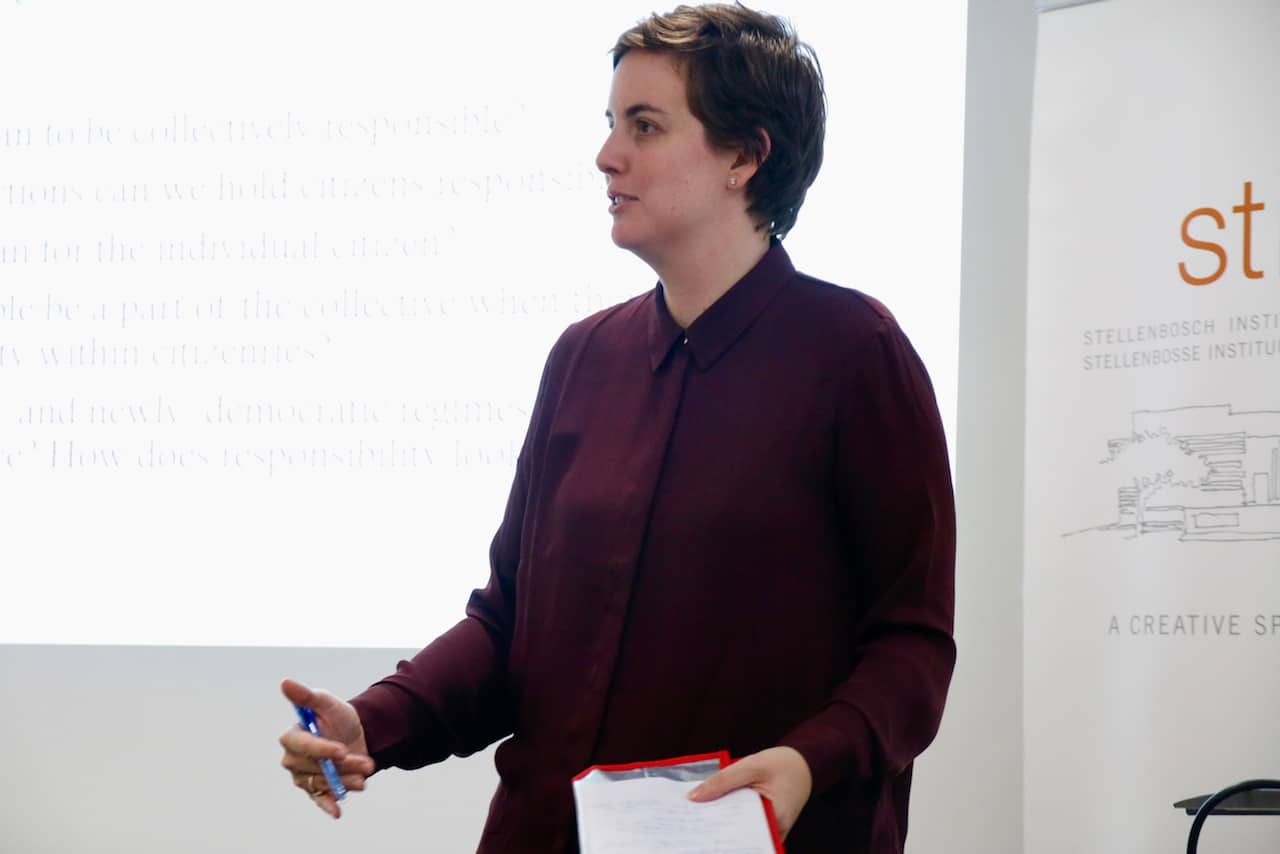“My project develops a political theory of citizenship for a globalised, but inter-national world. It begins from the current reality of a world divided into separate but deeply interconnected states and explores how we can best understand citizenship within this context. Ultimately, I argue for a citizenship that is state-based but globally oriented. Citizenship, so conceived, grounds duties for citizens as a collective to hold their state accountable to act justly on the global stage,” said Christine Hobden of the Department of Philosophy at the University of Fort Hare.

Hobden, who is a STIAS Iso Lomso fellow, is at the beginning of her three-year fellowship with her first priorities to finalise a book manuscript and plan a workshop in April which will further analyse what citizenship means in a globalised world. “We have to unpack how we think of ourselves as citizens in the world today,” she said.
She pointed out that in our everyday experience, and in the media, citizenship is often linked to migration, borders, and issues of legality. “The demarcation is often that of insider/outsider,” she said.
She also highlighted research and media focus on protest action, and declining voter turnout during elections – “in South Africa alone almost one million fewer people voted in the last election”.
“These are all important areas of citizenship and part of my research but today I want to introduce a more comprehensive underlying theory of citizenship; something I think is missing from our studies of citizenship today.”
“There is an increasing responsibility gap between citizens and state,” she continued. “Powerful actors make decisions which citizens feel detached from.”
“Even in countries with a long-standing democratic heritage, there is often little sense of the state acting on behalf of individuals especially in international affairs. People don’t feel connected to trade agreements and other interactions made on their behalf.”
Drawing on her classroom experience, Hobden, drew out some examples to highlight “the complex host of factors that inform who we consider to be within our government’s ambit of moral concern”. She discussed factors such as proximity, shared identity and culture, and historical ties.
She highlighted the need to consider “what kinds of issues are seen as up for democratic decision making and what the limits are on those decisions. There are always competing interests and demands on resources and political energy.”
In the face of pressing individual concerns, those outside our own state often don’t make it on to the radar but Hobden believes that, as citizens, we have to be concerned with how we treat people beyond our own state and also with how our actions directly or inadvertently affect others.
“Most states are the result of conquest, war, and oppression. They cause violence as well being responsible for the arbitrary determination of life chances for people. Some would argue that they are not morally justified at all, but they are the reality for now. So we have to understand what it means for us to be citizens.”
“I believe we need a framework to guide us. Something to orientate us in the difficult questions of how to be citizens in our complex world,” said Hobden.
She outlined what she described as a Consequentialist Cosmopolitan justification for the state. The Cosmopolitanism angle sees all people as being of equal moral worth, while the Consequentialist angle sees states as potentially the means to get there.
Hobden argued that this justification re-orients our view of citizenship. While our citizenship remains state-based, it is importantly outward-looking. “When living its best life, the state can help us to fulfil both our own and others’ needs,” she said. “But, we cannot do so in a way that undermines others’ ability to do the same.”
“Citizens need to be sensitive to the fact that asking their government for certain things might impact on what their government does to others,” she added.
“They need to hold their state accountable on the global stage – ensuring that it doesn’t harm or undermine other states and also fulfils basic duties to other states.”
But she acknowledged the complexity in achieving this and the need to differentiate what it means for different individuals given extreme inequality.
“I’m not advocating for global citizenship,” she continued, “I am advocating for a version of state-based citizenship as we know it, but one that takes global concerns very seriously.
While acknowledging that the realities of the global political economy, economic structures, and the growing power of corporate actors are all massively complicating factors, Hobden described herself as “looking for a normative ideal to guide us within our particular set of circumstances; an orientation from which to approach the many challenges of our unjust world”.
Michelle Galloway: Part-time media officer at STIAS
Photograph: Christoff Pauw
